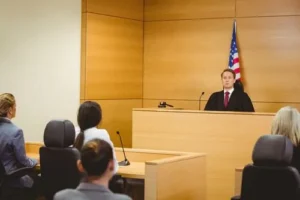“Can a security guard detain you?” A security guard refers to someone hired by the government or a private entity to protect that party’s assets from various hazards by enforcing preventative measures. Can they, however, impose their own laws by imprisoning someone without a warrant? How long may security guards lawfully hold people in custody?
It is critical to note that restriction of a person from moving freely against one’s will constitute detention by a security officer.
To put it another way, when a security guard detains a person, they are denying the person his freedom for a variety of reasons, such as trespassing, suspicion of theft, or unruly behavior. Otherwise, the detention becomes unlawful.
Can a security guard detain you: Who is a security guard?
A security guard patrols and checks both public and private facilities to deter theft, arson, vandalism, terrorist attacks, and other unlawful activities. Security guards may operate inside or outside, depending on the need for security. They may occasionally watch security cameras for any unusual activities. Usually, they collaborate with other security officers, as well as the staff and administration of the facility.
Can a security guard or officers detain you?
Undoubtedly, it is usual to hear of an instance where a security guard led a person who had committed theft or behaved violently at a gathering into a small space. So, can security personnel hold you? The basic answer is yes, but the issue is a little more complicated than that.
Security personnel are roughly equal to civilians in terms of their abilities. The execution of a citizen’s arrest is thus possible. Any private person, regardless of whether they witnessed the commission of the crime, can legally make an arrest of a person who has committed a felony under Louisiana Code of Criminal Procedure Article 214. The law in Louisiana requires that you turn the arrested individual over to the police as soon as is reasonably practicable; therefore, this arrest cannot last indefinitely. Consequently, a security guard has the authority to make a citizen’s arrest because they are a “private person.” But they can’t keep you in custody for an excessive period of time. As quickly as they can, they need to get in touch with a police officer and hand over the command.
In the event of shoplifting, Louisiana Code of Criminal Procedure Article 215 specifies the steps that a security officer must take while arresting a person accused of theft. Additionally, if there is need to use reasonable force, a security office may employ restraint to detain people.
Can a security guard detain you: Security personnel’s legal authority
Private security personnel typically lack the same power as police officers. A security firm is not different. They essentially have the same rights as the average private citizen to intervene in crimes, with the exception of helping in medical emergencies and disturbances of the peace. But be aware that different businesses, regions, and states have different rules regarding security guards. In the event of an emergency or potential criminal offense, a security guard’s only real option is to dial 911. To be certain of a security guard’s authority, consult your state and local laws.
Can a security guard detain you: What a Security Officer May and May Not Do
Police officers and security guards have a lot in common. People see them as authorities, law enforcement personnel, and representatives of law and order and frequently don uniforms, carry weapons (including firearms in some circumstances), and defend people and property.
An officer of the law is different from a security guard. Instead, a security guard has limitations placed on him because he works for a private corporation.
The legal implications of a security guard’s actions are, consequently, usually unclear. By taking into consideration the following points, you can better understand the role of security guards. Let’s examine what a security guard may and cannot do specifically.
1# Keep things safe
One of the most common duties of security guards is protecting property. A guard has frequently delegated authority in such circumstances, enabling them to maintain the safety of the area and the people there.
2# Arrest someone as a citizen
A security guard has the same rights as any other citizen present in a crime scene and where there is a concern for the public’s safety. After making an arrest, a guard should contact the police as soon as feasible. The guard has the right to remove any weapons that the arrested person may have.
3# Employ moderate force
The use of force by a security guard against a person while performing their job to protect individuals and/or property must be reasonable and justified. Before utilizing physical action, a police officer or security guard should explore alternative tactics, such as successful verbal discussion.
4# Can ask for a physical search.
Security officers typically need your permission before they can search you or your belongings. This includes the authority to conduct a luggage or vehicle search. This holds true for security personnel who believe they apprehended a shoplifter as well. Forcing a search is not one of their duties. If the subject refuses; in this situation, the security officer may detain the suspected shoplifter until a police officer arrived and could legitimately perform a forced search. Security guards, however, may ask for a physical search in the following circumstances:
- They have the right to examine any item of property, including bags left unattended in a suspicious circumstance because it could be a danger to the public’s safety.
- Security guards may search a person’s suitcase if they are seeking to identify an unconscious person so the person can receive medical attention.
5# Physically constrain
Security personnel may only use reasonable force when arresting a suspect. Additional force, including physical restraint and grasping, should only be used in dire circumstances and when detaining a person. This could happen if the suspect attempts to run after attempting to commit a crime or if security staff think they could endanger themselves or others.
6# Deny entry.
If the amenities are inaccessible to the general public, the property’s owner or manager may pick who gets in and who doesn’t. The security officer works for the manager or owner and has the authority to decide who enters the building. Security officers may deny entrance to into any establishment to anyone who refuses to allow a security officer to check their bag. Companies that operate around the clock frequently establish this as a common guideline.
7# Carry a weapon.
Because they have no more legal standing than the general public, security guards are not permitted to carry weapons. Security guards aren’t allowed to carry weapons like batons, pepper spray, or guns on them, much less deploy them as a deterrent. Front-of-house security officers are more likely to utilize negotiation approaches than physical force. While anyone may carry handcuffs, security officers may use it to make a citizen’s arrest. The proper and safe methods for doing this will be taught to the guards.
Security guards or officers are not police.
Security personnel should not act in any way that would suggest they are police officers, because they are not. They can also face repercussions for the business they work for.
You could be able to sue a security guard for using excessive force against you if they were not defending themselves.
Armed security officers
Some businesses hire armed security guards who are trained to carry guns and use lethal force when necessary. Armed security guards must follow the same standards as unarmed security guards until they earn a specialized police officer certificate.
Remember what a security guard can and cannot do if they hold you.
Related article:
HOW TO FIND OUT WHERE SOMEONE WORKS the Right Way
Reasons a Judge Will Change Custody Order: Top 7+ Picks
Signs That a Criminal Case is Weak and might be Dismissed!
Is Battery A Felony? Charges, Penalties, and Defence(Opens in a new browser tab)



